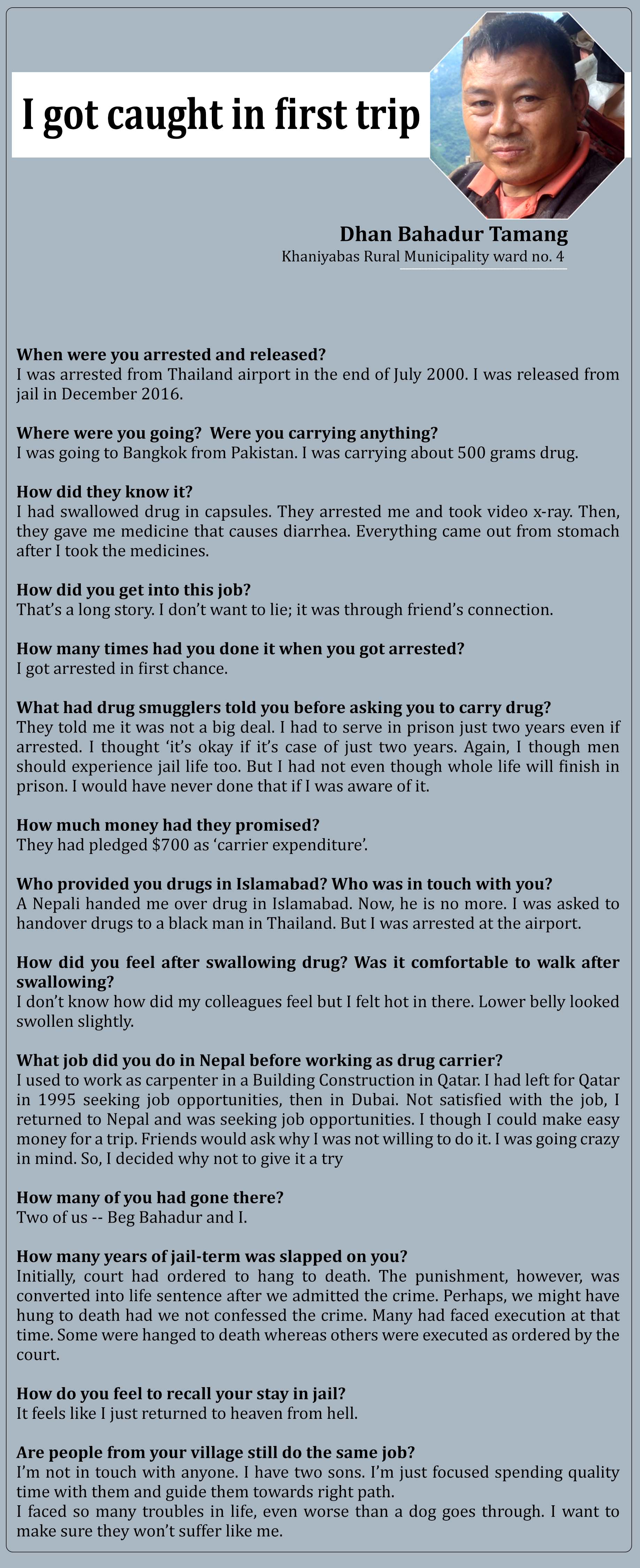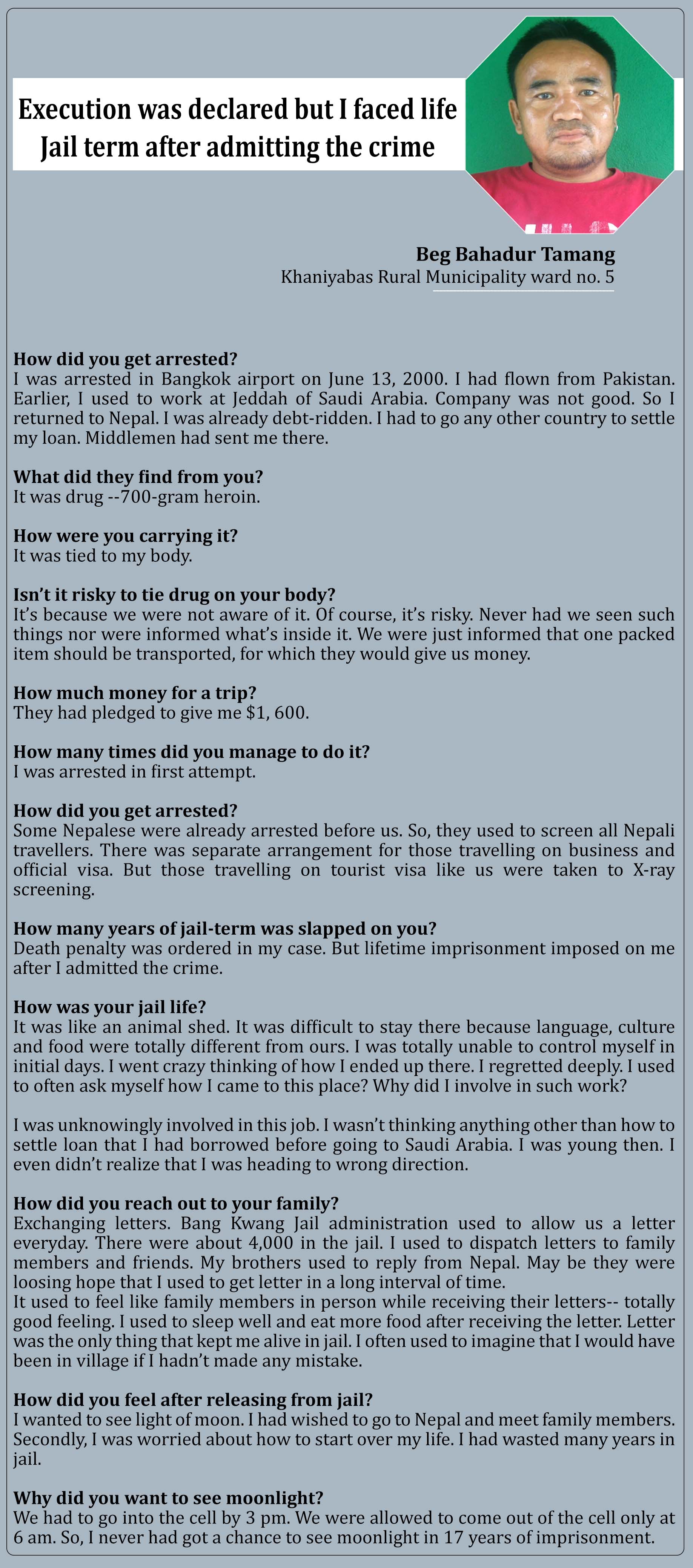In the past four decades northern villages of Dhading have been connected in global cases of drug trafficking, trading and selling. This story exposes drug connection of Satyadevi village to Pakistan, South East Asian countries and Australia.
Mani Dahal: Center for Investigative Journalism-Nepal
Thirty-six Nepalis are now serving jail term in Thailand for drug trafficking. Most of them are from Satyadevi, an isolated village of Khaniyabas Rural Municipality, Dhading.
Two locals—Beg Bahadur Tamang, 41 and Dhan Bahadur Tamang, 48 from Dhading—convicted for drug trafficking, were rereleased from a Bangkok jail some three years ago after serving almost 17 years jail term. Both the drug carriers were arrested at Bangkok airport shortly after reaching there via Islamabad in May 2000 carrying drugs. (Read Interview)
Iman Gurung and Arun Kumar Tamang were also released together with them. They were arrested from the same Bangkok airport in June 2000. The modus operandi of drug carrying was similar.
 Thai court had initially ruled death penalty against them but execution was reversed after they admitted their crime.
Thai court had initially ruled death penalty against them but execution was reversed after they admitted their crime.
Three out of four persons convicted in drug smuggling are from northern Dhading. Beg Bahadur and Arun Kumar are from Satyadevi, and Dhan Bahadur is from neighboring village, Darkha.
Four days after 2015’s devastating earthquake in Nepal, Indonesia executed nine individuals including two Australians–Myuran Sukumaran and Andrew Chan–for drug offences. Australia recalled its envoy to Indonesia to protest the move.
Along with Chan and Sukumaran, a mastermind of a drug smuggling ring seven other who were said to be part of world famous drug smuggling case called Bali Nine, arrested in Bangkok in April 17, 2006.
Some of them were on a flight bound for Australia while others were detained from hotel. They were carrying 8,300 heroin, police claim.
Later, Australian media reported a Nepali–Man Singh Ghale—was also in this drug case.
Ten days after his arrest, a joint team of Australian and Indonesian police raided Ghale’s residence in Jakarta, the capital city of Indonesia. Indonesia police claimed Ghale was killed on the spot after he tried to escape in course raid.
Informed sources claim that Ghale had close ties with Indonesian police and they killed him in a raid so that his nexus with police could be put in the dark.
Interestingly, Ghale is also from Satyadevi village.
Satyadevi’s drug connection doesn’t end here. On March 30, 2017 Nepal Police arrested Purna Bahadur Pakhrin from Kapan. They confiscated 302 grams contraband amphetamine and cash NRs 5 million. After supplying the drug from Thailand Pakhrin was preparing to send the same to Europe.
During police interrogation Pakhrin disclosed that he had received the drug from Dharma Pakhrin. Police records show Dharma is well connected in international drug trafficking network. Dharma lives in Thailand and supplies illegal drugs including amphetamine to Asian, Australian and European counties.
By relation Purna and Dharma are brothers. And both are Satyadevi locals.
As per information provided by Nepali Embassy in Bangkok, 36 Nepalis are now serving their jail terms ranging from 14 to 36 years for drug offences. And most of they are from Satyadevi — an isolated village of northern Dhading.
The village lies 35 kilometer north from Dhadingbesi, the district headquarter. Mount Ganesh lies on its northern side of this village, where a majority of residents are Tamang. This village is now part of ward no 5 of Khaniyabas after new 2015’s federal set up. Before 1976, this village was the part of Rasuwa district.
Int’l drug connection
To know about how dirt poor of this remote village got connected to global drug trafficking network one has to go three decades back.
In early 80s when Panchyat system was in place, Jhitigunta — provisions of accompanied and unaccompanied goods—was introduced. Businesspersons used to take unemployed youths to third world countries for importing goods using them as porters. Those youths used to return together with businesspersons carrying radio, Television, electronic and garment items from abroad.
After new jhitigunta rule in which taxes of certain amount of goods were waived ‘porter’ using trend had flourished. Poor and unemployed youths used to get double opportunities of foreign junket and wages for importing goods of businesspersons from there. Businesspersons used to make more profits by selling tax-free goods in Nepal’s local market. Increased smuggling of gold and drugs is linked to jhitigunta provisions.
Former DIG Hemantha Malla Thakuri, who worked for long as head of Narcotics Drug Control Law Enforcement Unit, agrees jhitigunta provision encouraged all kinds of smuggling including drugs.
 “Jhitigunta provision has key role behind flourishing gold and drug smuggling cases,” said Malla adding, “Those who initially supplied cloths and electronic goods later involved in smuggling drugs and gold.”
“Jhitigunta provision has key role behind flourishing gold and drug smuggling cases,” said Malla adding, “Those who initially supplied cloths and electronic goods later involved in smuggling drugs and gold.”
Locals say Ganesh Lama, a local of Satyadevi used to work porter of businessperson and frequently travelled to Hong Kong, Bangkok and Singapore. Later, he was connected to drug smugglers. After serving jail term in Thailand he has now settled in Kathmandu. Several locals of this village worked as drug carrier due to his connection.
Malla believes trend of drug porters developed from Manang and expanded to Lamjung and Gorkha. “Only trusted people of businessperson get involve in drug carrying to maintain secrecy about each others’ involvement in drug smuggling. That’s what happened in case of Satyadevi too,” said Malla who had visited Thailand, Indonesia and Singapore during his serving term in Nepal police, “Some drug smugglers who worked as drug carrier can now operate global drug smuggling network. But many have destroyed their own life instead of earning money.”
He recalls Indonesia had suspended on-arrival visas to Nepalis after Ghale case.
Investigators say Nepali drug smugglers’ ‘connection to Pakistan and African countries is very interesting.
Former DSP Gopi Krishna Paneru, who worked more than two decades at the Police’s drug unit, said Gopi Tamang alias “Sahii’ of Satyadevi used many locals as drug carriers after she was married with a Tanzanian named Musa. “Sahili and Musa are based in Pakistan and Afghanistan and are supplying drugs from Australia to Europe.”
On April 13 2009, nine persons including three Tanzanians were arrested together with cash USD 10,600 from Gopi’s Balaju-based house. Of the arrestees– Dol Kumari Tamang, Maisang Tamaig, Anita Gurung and Naresh Tamang—were from Satyadevi. Working on a tip that Sahili is also with them police had raided her house but she was not home, according to former DSP Paneru.
Poverty-induced Crisis
These days, most locals in Satyadevi have stopped working as drug mule. Some lucky youth who survived police actions are returning home after serving jail terms for drug offences while many other from this village are still languishing in foreign jails.
According to Embassy in Thailand, 57 Nepali were in Thailand’s jails in 2015. Out of total 31 were from Dhading. Among those 24 were from northern Dhading villages namely Darkha, Satyadevi, Tipling, Sertung and Jharlang. To be more precious, 17 were from Satyadevi.
Besides Bangkok jails two Nepalis are serving jail term in Singapore, one each in prison of Macau, China, Sri Lanka and India, according to Prisoners’ Exchange Agreement Nepal (PEAN), a NGO established to assist release of youths facing jail term for drug trafficking. They all are northern Dhading.
Pritam Gurung of Satyadevi is now in Singaporean jail. He was arrested from a Singaporean hotel in December 2005. During a meeting at Basala of Dhading in September last year Pritam’s bother, Ayush, had complained that agents framed his brother by promising employment opportunities.
“It is learnt that he was not carrying anything. But Korean friends implicated during [police] interrogation,” said Ayush.
Bir Bahadur Tamang, former chief of Satyadevi, who now leads PEAN, says locals from his village are not involved in drug carrying business anymore. “Many have now understood that it’s a bad job. They have realized one has to serve jail terms for long and may face death penalty as well. That’s why trend of going to work as drug carrier has almost come to an end,” said Lama adding, “Some may go secretly but none has done it openly.”
It was too common to work as drug carrier some three decades ago. “Working as drug carrier was so common that it was just like joining a common job. Many youths used to arrange expenses for Dashain,” said Gopal Phyuwa, a teacher at Gneshkunda Higher Secondary School recalling those old days, “I myself was preparing to go for drug carrying job.”
Unlike locals’ claim former DIG Malla says Satyadevi youths are still continuing work as drug carriers. “They are not just queuing for job but the same hasn’t been stopped yet,” said Malla. “It’s not openly known as they were in an organized manner in the past.”
Budharam Tamang, chairperson of Khaniyabas Rural Municipality (which includes the then Satyadevi VDC) ward no. 5, said lured by money many youths are trapped in drug carrying job.
“Lured by money and having no knowledge about destination and nature of job youths involved in drug carrying business and many of them are now trapped. Some of them died there and some have returned alive.”
Many locals of Satyadevi are still in foreign jails. Budharam says, “Although we want to rescue them we are helpless since rescue is purely an bilateral issue,” Tamang said requesting to initiate rescue operation, “They all are poor people and still poor. Let’s do something if anything is doable.”



